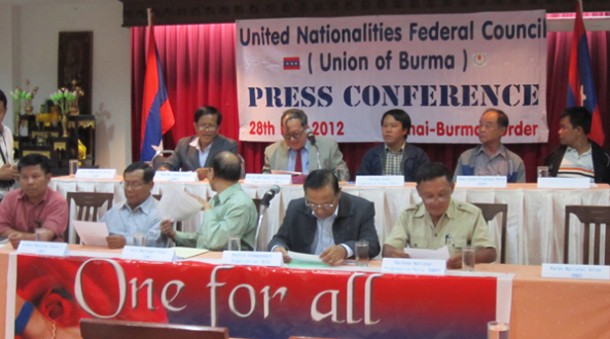Burma’s ethnic armed groups have agreed their own standard plan for peace negotiations in order to challenge government attempts to push minorities into Parliament.
More than 100 ethnic leaders and civil society representatives attended a three-day “ethnic conference” in Chiang Mai, northern Thailand, from Friday to discuss how to implement peace in Burma which enshrines rights for minorities.
A statement released after the close of the ethnic conference on Sunday said, “We do not believe that the peace plans from the government can implement peace in the country. Therefore, we formulated our own proposal which can build real peace.
“To have peace and unity in Burma, it is the duty for all people to work together. Therefore, we brought different representatives here in order to discuss and determine solutions to problems and how to have peace in the Union of Burma.”
Their agreed plan has six points: to host a meeting with civil society and all ethnic armed groups; a meeting between all ethnic armed groups and government representatives monitored by the international community; referendums in each ethnic state to ratify agreements reached; a meeting with all ethnic people to talk about peace; tripartite dialogue between the government, democracy activists and ethnic people; and implementation of agreements reached.
The proposal contrasts with efforts by Naypyidaw which focus on ceasefires, economic development and forming ethnic political parties to contest elections and enter Parliament. Ethnic leaders say they do not want legislative representation as the 2008 Constitution is undemocratic and so they insist on forging political agreements outside the institution instead.
Ethnic leaders say their plan would also prevent the Burmese government choosing their own candidates for regional posts as they would have to negotiate with minority groups first.
Speaking to The Irrawaddy on Monday, Dr. Sui Khar, a leader of Chin National Front, said, “We arranged this conference because we do not want a repeat of the National Convention [in 2007]. At that time, they elected people who they liked and even wrote plans without asking for our input.
“Now, we have written our own plan for what we want them to do,” he added.
Fighting can break out again in the country if armed groups are forced to abide by the government’s own peace plan, claim ethnic leaders.
“The government needs to be careful when they handle ethnic issues. If not, fighting can spread across the country at any time,” said a representative from a Kayan civil society group who asked to remain anonymous.
Despite the government claiming that it has agreed ceasefires with 11 ethnic armed groups, there have been regular skirmishes with Shan rebels and Naypyidaw also rejected a request from the Karenni National Progressive Party for a resettlement base. Political talks have also not yet taken place with any ceasefire group.
Ethnic leaders believe they can put pressure on the government to hold political dialogue with all armed groups by standing united and emphasizing the common ground between different rebel armies.
Leaders point to previous ceasefires which never progressed to political dialogue and eventually broke down, such as the government’s 17-year ceasefire with the Kachin Independence Army which came to an end last June.
Nai Hang Thar, secretary of United Nationalities Federal Council umbrella organization of ethnic armed groups and also the secretary of the New Mon State Party, said, “To have common agreement is a force for ethnic people to show the government that we are united and we have our own plans for what to do regarding the implementation of peace in the country.
“No matter if they do not accept our plan, we can show them that this is our common plan to solve the problem of ethnic conflicts.”
Despite different ethnic armed groups holding separate peace talks with the government, these individual deals will have to be based upon the six-point plan agreed in Chiang Mai to ensure all groups are consistent with each other, claim ethnic leaders.
They added that ethnic groups cannot compete with the Burmese government in Parliament due to the 25 percent of seats reserved for the military. “They have a majority of people at Parliament so we cannot fight for our ethnic rights there,” said Nai Hang Thar. “This is why we must find a political solution outside Parliament.”
















